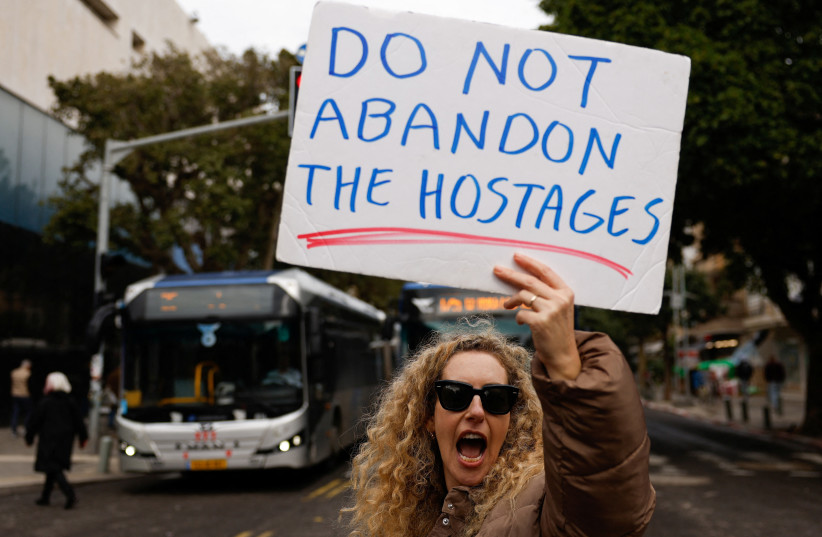US Secretary of State Antony Blinken called on Hamas to accept the terms of a hostage deal as Prime Minister Benjamin Netanyahu insisted that Israel would enter Rafah to destroy its battalions irrespective of any agreement.
“Our focus right now is on getting a ceasefire and [the] hostages home. That is the most urgent thing and it’s also, I think, what is achievable,” Blinken told reporters in Jordan, hours before arriving in Israel on Tuesday night.
He is slated to meet with Netanyahu on Wednesday to discuss the deal, as the situation hits a fateful moment in which there is likely to be a deal or a military operation in Rafah.
Israel, Blinken said, has “put a strong proposal on the table.” It has demonstrated it’s “willing to compromise, and now it’s Hamas.
“No more delays. No more excuses. The time to act is now,” he stated.
“We want to see in the coming days this agreement coming together, because” it is the best way to “deal with the suffering of people and also to create “something that’s sustainable, and that has lasting peace for the people who so desperately need it,” he said.

Blinken meets with King Abdullah in Jordan
Blinken arrived in Israel after meeting with King Abdullah in Jordan, and in Riyadh with Arab foreign ministers and with Saudi Crown Prince Mohammed Bin Salman.
He discussed the hostage deal and the importance of increasing humanitarian assistance to Gaza in each of his conversations.
An issue for Hamas in arriving at a hostage deal has been preventing Israel from continuing the war. Netanyahu clarified on Tuesday that this was out of the question.
“It’s out of the question to consider that we would stop the war before achieving all of its goals,” Netanyahu said.
“We will enter Rafah and eliminate the Hamas battalions there – with or without a [hostage] deal, in order to achieve absolute victory.”
The US has opposed a Rafah operation with a viable Israeli plan to protect the Palestinians in Gaza but has agreed that Hamas cannot remain in Gaza.
US National Security Communication Advisor John Kirby said, “We don’t want to see a major ground operation in Rafah” and certainly not one that hasn’t “factored in safety and security of those 1.5 million” Palestinians who have sought refuge there.
Israel has believed that a Rafah operation is an important pressure lever to sway Hamas to make a deal. Initial reports out of Cairo, where Egyptians had seemed to advance the matter, were positive, but on Tuesday night, some skepticism had set in, as to whether Hamas could let go of its demand for a permanent ceasefire.
The initial framework for a deal had included the release of 40 of the remaining 133 hostages in exchange for a six-week pause to the war. Israel would also be expected to release terrorists it had jailed for killing Israelis.
There have been reports that Hamas dropped the number of live hostages included in the deal to 33 and KAN reported on Tuesday that the number could even be as low as 18.
A Hamas delegation left Cairo late Monday to consult with the group’s leadership on the latest, tweaked proposal and was expected to report back within two days, two Egyptian security sources said.
Egyptian security sources, who spoke on condition of anonymity, said some amendments had been made on conditions for a final ceasefire in Gaza demanded by Hamas, and around the Palestinian group’s demand for an
Israeli withdrawal from the coastal enclave.
Hamas had said on Saturday that it had received Israel’s latest position and would study it before submitting a reply.
Israel had initially been expected to send a delegation to Cairo for additional talks on Tuesday, but held back from doing so, until it had a firm answer from Hamas, according to media reports.
Netanyahu has been under pressure from hostage families, who fear that making a deal for only some of the hostages would make it harder to free all of them. The prime minister’s coalition partners on the Right have warned they would disband the government if Netanyahu did not conduct a military operation in Rafah.
Separate from the issue of hostages, Blinken is also expected to discuss needed improvements on the issue of humanitarian assistance to Gaza.
Blinken said he would “go over with the Israeli government the things that still need to be done if the test is going to be met of making sure that people have what they need.”
Reuters contributed to this report.
